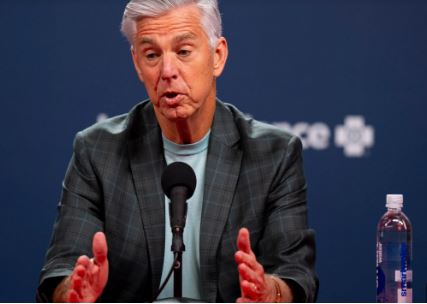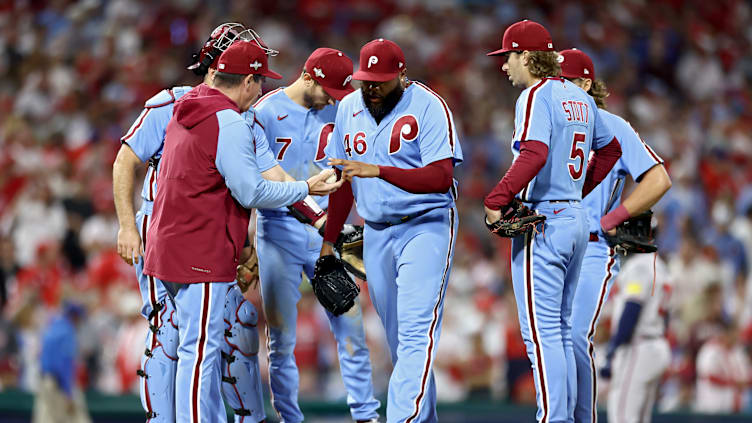
The Philadelphia Phillies had an impressive season, posting a 95-67 record—their best in 13 years—and securing the NL East division title.
However, their early playoff elimination by the New York Mets in the NLDS has left a sense of disappointment. With expectations high for the Phillies to make a strong World Series run this year, it’s worth examining which personnel might have contributed to their unexpected downfall.
Let’s take a closer look at five Phillies who, in different ways, played a significant role in the team’s disappointing 2024 season.
5 Phillies most to blame for disappointing 2024 season
Bryson Stott
After a standout 2023 season, expectations were high for Phillies second baseman Bryson Stott. His teammate, Bryce Harper, even called him the “best second baseman in the league” following Game 5 of the 2023 NLCS. However, Stott’s performance in 2024 fell short of these expectations, leading to significant disappointment.
His statistics dropped sharply from a .280/.329/.419/.747 line with a 103 OPS+, 78 runs, 32 doubles, 15 home runs, and 62 RBIs in 2023 to just .245/.315/.356/.671, an 89 OPS+, 65 runs, 19 doubles, 11 home runs, and 57 RBIs in 2024.
As a key contributor to the Phillies’ offense in the lower half of the lineup, Stott’s noticeable decline made it easier for opposing teams to handle the Phillies’ batting order once they got past the top five hitters. By season’s end, some even speculated whether he should be part of a platoon rather than serving as the everyday starter at second base moving forward.
In the playoffs, Stott struggled to make an impact, aside from his crucial two-run triple in Game 2 of the NLDS that briefly gave the Phillies the lead. He spent one game on the bench and finished the postseason with a .182 batting average and .672 OPS, contributing just one run and two RBIs over four games. Stott will certainly aim to rebound in the 2025 season, but his 2024 performance is one he’d likely prefer to forget.
José Alvarado
Once a reliable ace in the Phillies bullpen, José Alvarado had a disappointing 2024 season. After consistently recording sub-3.20 ERAs and an impressive strikeout rate of nearly 14 strikeouts per nine innings in the previous two seasons, the Phillies expected him to elevate his performance when he was promoted to the closer role this year. Given his previous success in ninth-inning situations, the team anticipated he would thrive in this capacity.
Unfortunately, Alvarado struggled significantly throughout the 2024 season. His performance deteriorated so much that he was eventually removed from the closer role after a rough July, particularly following the acquisition of closer Carlos Estévez from the Los Angeles Angels.
By the end of the season, Alvarado had a 2-5 record, a 4.09 ERA, and a 1.25 WHIP, allowing a career-high 28 earned runs and six home runs over 61 2/3 innings in 66 relief appearances. His once-dominant pitches became more hittable, and his 9.2 K/9 strikeout rate was the lowest since his rookie season in 2017.
Due to his inconsistency and ineffectiveness during the regular season, the Phillies opted to limit his appearances in the 2024 postseason. Alvarado ended up pitching in just one game in the NLDS, where he allowed two runs in two-thirds of an inning.
If Alvarado had performed as he did during the Phillies’ 2023 playoff run, Philadelphia wouldn’t have had to rely on other pitchers in high-leverage situations, many of whom faltered and contributed to the team’s postseason collapse. Alvarado will now have the offseason to work on regaining his reliability for the 2025 season, aiming to help solidify the relief corps once again.

Kevin Long
When the Phillies’ offense was firing on all cylinders in the first half of the season, concerns about their production were minimal. However, as several players, including stars Bryce Harper and Trea Turner, went through significant slumps later in the season, the underlying problem remained unaddressed. This struggle culminated in a lackluster 33-33 record after the All-Star Break as the team entered the postseason.
With the offense faltering, hitting coach Kevin Long was tasked with finding a solution before the playoffs began. Opposing teams capitalized on the Phillies’ tendency to chase pitches, and many players failed to adjust accordingly.
They struggled particularly with non-fastballs, resulting in the fourth-highest chase rate in the league at 35 percent in 2024. As noted by our own Michael Fisher, this issue was also apparent during last year’s playoffs and resurfaced in the final month of the 2024 season.
It’s unclear whether they didn’t address the problem adequately or if Long was unable to change their plate discipline. The consequences were evident, as the Phillies struck out an alarming 38 times over four games in the NLDS against the Mets. These strikeouts thwarted many potential rallies, preventing the team from mounting effective comebacks.
Moving into 2025, addressing this issue will be crucial for improvement. Unfortunately, for the 2024 season, it significantly contributed to their downfall in the latter half.
Rob Thomson
In his three seasons managing the Phillies, Rob Thomson has demonstrated considerable success with his in-game decisions. He has led the team to three consecutive postseason appearances, coming close to a World Series title in 2022.
However, his choice to utilize closer Craig Kimbrel in the previous postseason may have played a role in the Phillies’ downfall, highlighting that even successful managers can make mistakes.
Unfortunately, some of these misjudgments carried over into the 2024 season, as Thomson made several questionable decisions throughout the year. The most notable was his continued use of Taijuan Walker in the rotation despite his clear struggles. By the time he moved Walker to the bullpen, the damage was done, preventing the Phillies from finishing first in the league and securing a more advantageous playoff matchup. Additionally, failing to rest Bryce Harper sufficiently down the stretch, despite his persistent injury, limited his effectiveness.
More critically, Thomson made significant errors during the NLDS, particularly in the Game 4 elimination. If given the chance to revisit some of his choices, he would likely approach them differently.
On the positive side, Thomson is a smart manager who should learn from these missteps and avoid repeating them in the future. The downside is that for the Phillies, the 2024 season is already over, leaving Thomson without an immediate chance for redemption until next year.
Dave Dombrowski
This list wouldn’t be complete without mentioning the individual who could have significantly impacted the team: president of baseball operations Dave Dombrowski. Even before the start of the 2024 season, Dombrowski had a clear vision for success, emphasizing the need for star players to achieve that goal.
During the 2023-24 offseason, the Phillies made several free-agent signings and waiver claims, but none proved to be impactful. One of their major signings, utility player Whit Merrifield, turned out to be a disappointment, leading to his release midway through the 2024 season.
Dombrowski had an opportunity to rectify these missteps at the trade deadline, aiming to reshape the Phillies for a strong playoff run. Despite having potential game-changers like Brent Rooker and Luis Robert Jr. available, the Phillies opted for outfielder Austin Hays, who turned out to be a minimal addition due to his inability to stay healthy and his lack of production when on the field.
The team also acquired Carlos Estévez and lefty Tanner Banks to strengthen the bullpen. While they performed decently down the stretch, the absence of big-name relievers like Tanner Scott and Michael Kopech at the deadline left the Phillies without crucial star power that Dombrowski values and which could have been game-changers for the team.
Ultimately, none of the three deadline acquisitions made a meaningful impact when it counted most. Hays played in two playoff games, striking out three times in four at-bats. Banks appeared in just one game, allowing one run on two hits in an inning of relief. Estévez fared the best among the trio, but he still surrendered a critical hit to Francisco Lindor in Game 4, effectively ending the Phillies’ season.
Overall, it seemed that the Phillies either maintained the status quo or even regressed this season, despite all their moves. Consequently, Dombrowski will need to focus on a productive offseason to get the Phillies back on track for a better performance in 2025.
Leave a Reply